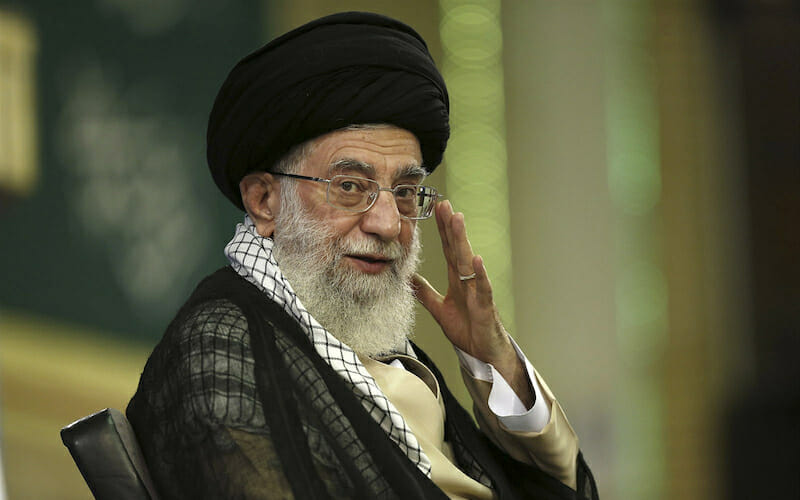
Khamenei’s Ultimatums May Just Conceal Tehran’s Vulnerabilities.
While the debate on Iran policy is raging in major capitals on both sides of the Atlantic, Iran’s supreme leader has been threatening to increase the nation’s enrichment of nuclear material while issuing ultimatums to those in Europe.
Supreme Leader Ali Khamenei has laid out eight specific conditions that he expects the West to meet before any further negotiations over the future of Iran’s nuclear program can be discussed. These demands make it clear that his regime intends to exploit Western discord in negotiations to obtain an even better deal than that achieved in earlier negotiations in which Tehran came out on top.
Among other objectives, Khamenei has raised an expectation that the European Union will concede to his demands to remove entirely the issues of Iran’s regional military intrusions and its ballistic missile program from the agenda for future discussions. Khamenei also expects the European Union and its partner nations to actively resist all sanctions imposed by the United States – including those that target the regime’s human rights violations and support of terrorism, in addition to those that relate to nuclear activity.
These demands suggest that Khamenei and his subordinates don’t fully appreciate Europe’s commitment to upholding human rights and enforcing international conventions, which is not to say that the Joint Comprehensive Plan of Action (JCPOA) was entirely without value or, indeed, that the Trump administration was right to abandon it in the specific context of promoting human rights. The demands do however tend to underscore the well-known criticisms of the nuclear agreement with Iran and the assessment that a better and much more comprehensive agreement could have been secured if the US and its allies had approached the initial situation from a position of strength. Such criticisms might be less compelling had the JCPOA realized the planned objective of encouraging moderation within the Iranian governing regime, but Khamenei’s ultimatums, and the persistently destabilizing policies of the Islamic Republic, demonstrate that such expectations on the part of Europe toward the JCPOA were probably somewhat naïve.
Khamenei’s latest outbursts of anti-Western rhetoric might be the final nail in the coffin for the notion that the existing regime might turn away from its old ways. It is an idea that seems particularly quaint when one looks at Tehran’s contributions to the bloodshed in Syria, its imprisonment of Western citizens and permanent residents, and its suppression of political dissent throughout Iranian society. All these behaviours have clearly escalated during the period that the JCPOA has been in effect.
It must be acknowledged that it would always have been difficult for the nations of Europe to react appropriately to a regime that appears incapable of moderation. With hindsight we can see that the Western impulse toward appeasement has arguably been based not on confidence in Tehran’s capacity for reform but instead on concern that the only alternative to dealing with the clerical regime is waging war upon it.
Support for the opposition movement against the ruling clerics is arguably at an all-time high in Iran, having spawned a nationwide uprising at the end of last year, which proceeded for several weeks after taking the government completely by surprise. That surprise was evident from Khamenei’s own reaction, when he gave credit for the rapid spread of protests to the People’s Mojahedin Organization of Iran (PMOI/MEK), a pro-democracy resistance group that Tehran has long sought to dismiss as lacking in credibility and popular support.
Maryam Rajavi, president-elect of the coalition of National Council of Resistance of Iran (NCRI), of which the People’s Mojahedin Organization is the largest member organisation, predicted in March that the legacy of the December-to-January uprising would be “a year full of uprisings” and continuing protests throughout Iran suggest that is exactly what the nation is facing today. The domestic unrest also makes it clear that the Iranian regime is vulnerable and in no position to be making demands of the international community. The nations of Europe should avoid making concessions in the face of Khamenei’s ultimatums in respect of the JCPOA.
What the European Union, and probably the world, should do instead is begin to voice their support for the Iranian people and their increasingly organised, democratic resistance movement. Opportunities to do this are numerous and many could helpfully focus international attention on the progressive social and economic aspirations of the ordinary people of Iran. Some of these opportunities will be discussed by academics and lawmakers drawn from the international community at the end of June at a conference entitled “Free Iran 2018 – the Alternative,” scheduled to take place outside Paris.
Iran’s human rights record will come under scrutiny at the conference and here Tehran’s capacity for economic and social reform will be evaluated, not only in terms of addressing mounting international concerns but in terms of proactively supporting the people of Iran against whom the clerical regime is effectively waging war.
Ultimately the conference, and its plenary events, will build the international community’s capacity to support the growing influence of the Iranian resistance movement and its increasingly sophisticated range of policy alternatives that now challenge the clerical regime from both inside and outside Iran’s borders.
There are currently few political situations in the Middle East with the catastrophic potential of Iran and the West must work to understand how Khamenei’s ultimatums might conceal Tehran’s vulnerabilities.

